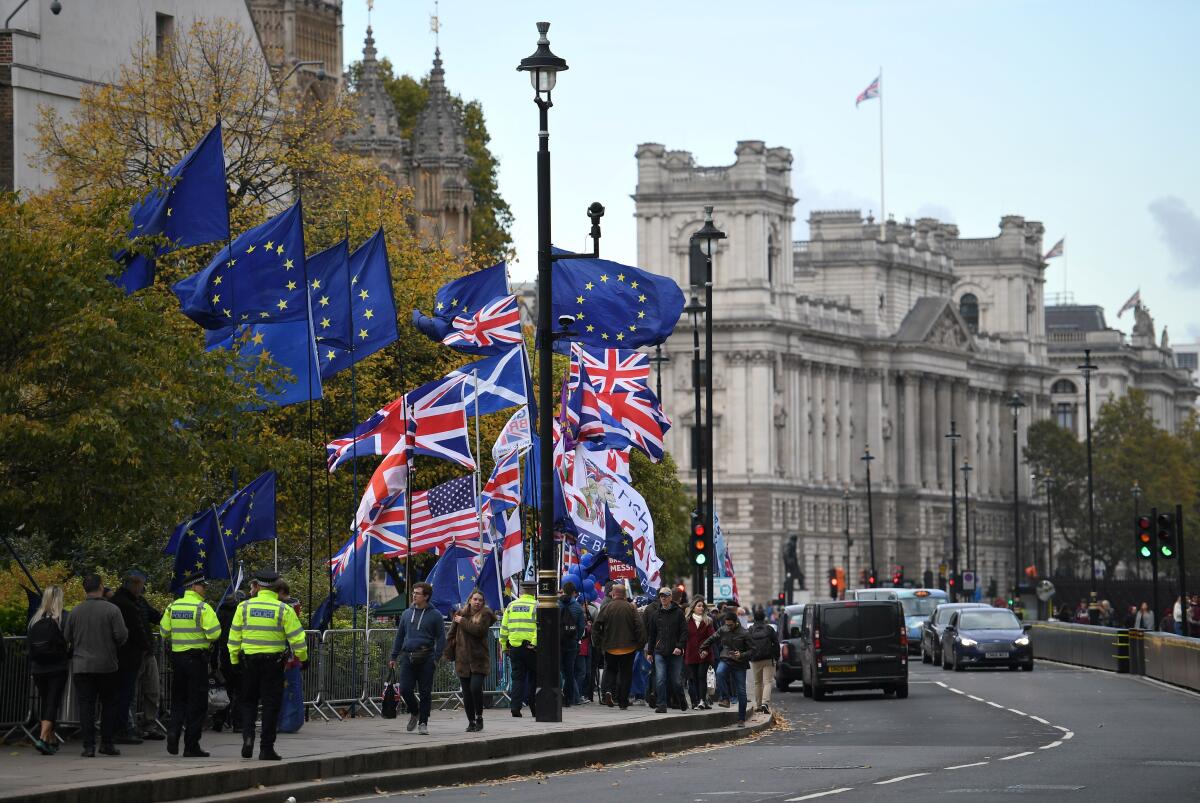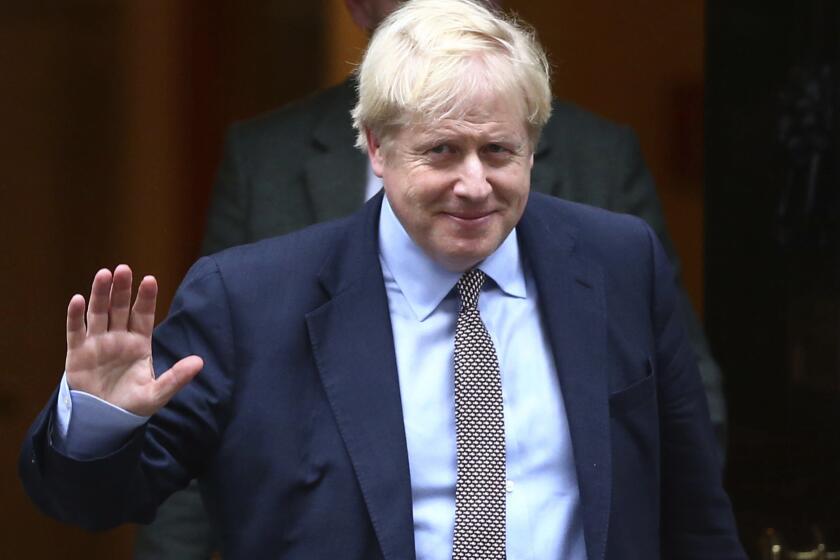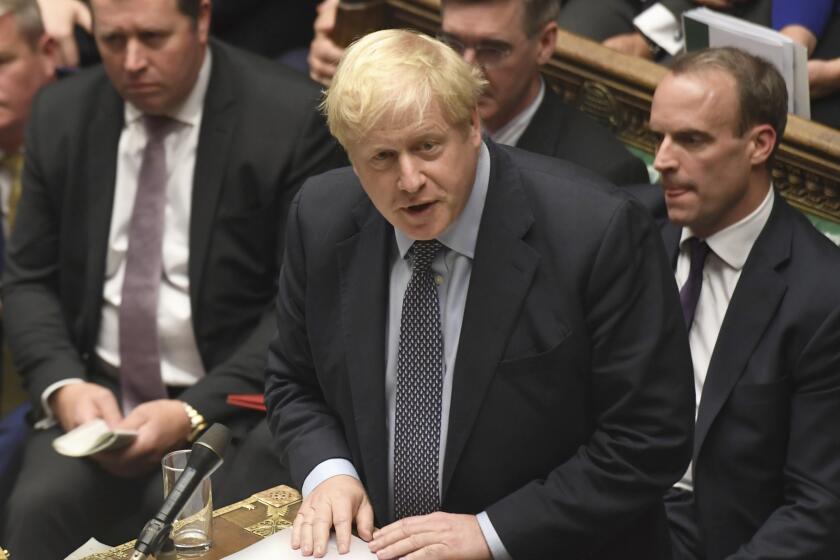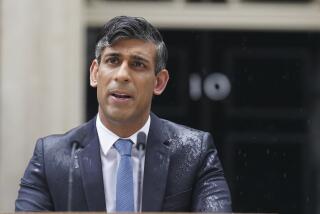A rare December election in Britain will be dominated by Brexit

- Share via
LONDON — British lawmakers on Tuesday endorsed a rare December general election, with politicians on both sides of the Brexit divide supporting balloting that they hope will at last break the impasse on when, how and whether to leave the European Union.
The daylong haggling over the exact election date came just two days before Britain was set to miss yet another scheduled date for departing the EU. Prime Minister Boris Johnson — who had earlier declared he would rather be “dead in a ditch” than seek an extension of Thursday’s deadline — accepted the bloc’s offer of a postponement of up to three months, the third such delay.
Well into the evening, the House of Commons overwhelmingly endorsed a Dec. 12 date for the vote. Following expected approval by the House of Lords, Parliament will be dissolved next week and the country will head into a five-week election campaign.
Lawmakers on Monday had rebuffed a call from Johnson to hold early elections, but the opposition Labor Party on Tuesday reversed itself and signaled support for December balloting after the prime minister agreed to drop — for now — the EU-withdrawal plan he had unsuccessfully tried to fast-track through Parliament in time to meet this week’s deadline.
Elections weren’t scheduled to take place until 2022. But the June 2016 referendum to leave the EU has produced more than three years of political infighting that has toppled two prime ministers, polarized families and communities and been a continuing irritant for the EU, which has signaled increasing impatience with repeated delays.
In setting the stage for a Brexit-dominated confrontation at the ballot box, both sides face a major gamble. Johnson, who took office in July, risks punishment at the hands of voters who embraced his promise that he would deliver an Oct. 31 Brexit — “do or die,” and “no ifs or buts.”
But those who support remaining in the EU — or at least want to head off a chaotic no-deal departure from the bloc — face an uphill fight too. Johnson will probably benefit from a divided opposition, with proponents of staying in the bloc split among several parties.
In his short tenure as prime minister, Johnson has suffered serial Brexit-related rebuffs from lawmakers, but he may be able to turn that to his advantage — by blaming Parliament for thwarting his plans.
As he has previously, the prime minister on Tuesday excoriated lawmakers for boxing him in with an earlier measure to prevent Britain from “crashing out” of the EU without a withdrawal agreement, a scenario that would probably cause enormous economic upheaval and possibly tip the country into a recession. Until that law was passed, and even after, he threatened that Thursday’s departure would proceed, deal or no deal.
The European Union agreed to delay Brexit until Jan. 31 — making the concession just three days before Britain was due to become the first country ever to leave the 28-nation bloc.
“They just want to stay out forever, till the twelfth of never — and when the twelfth of never comes around, they will devise one of their complicated parliamentary procedures for more delay,” he told Parliament members during a sometimes-raucous debate, waving his arms for emphasis.
The head of the opposition Labor Party, Jeremy Corbyn, in turn decried Johnson’s “reckless and destructive” government and taunted the prime minister for running after “sweetheart trade deals with Donald Trump.”
The U.S. president has been an enthusiastic Brexit booster, suggesting that Britain’s rupture with its biggest trading partner, the EU, will be offset by closer trade ties with the United States. Critics like Corbyn, though, say that Britain would be at a considerable disadvantage in such trade negotiations, particularly under Trump.
Public polling puts Johnson’s Conservatives in the lead heading into a new vote, but analysts warn that public opinion is particularly volatile and that an election result is difficult to forecast. A close contest could result in no clear path forward.
The vote likely makes it impossible for the prime minister to fulfil his vow to take Britain out of the European Union on the scheduled date of Oct. 31.
Another wild card: Johnson could find himself outflanked on the right by the insurgent Brexit Party, which romped to a strong showing in May’s European Parliament election. That could drain off some of the Brexit support from the prime minister’s Conservatives.
The push for a December vote illustrated the immense degree of frustration felt by both sides as the Brexit battle has dragged on. Not since 1923 has Britain held a general election in the last month of the year, when there are worries that gloom, cold and early darkness, particularly in the north of the country, could suppress voter turnout.
And even a multicultural modern Britain takes its year-end holidays very seriously, with weeks of shopping and holiday parties. Often, not much else gets done in the run-up to Christmas.
The precise dates under consideration, though only days apart, were also sensitive because college students — a key constituency, since their futures stand to be greatly affected by Brexit — would be heading home for a holiday break. Many are registered to vote where they attend school rather than in their hometowns. The opposition sought Dec. 9 balloting, when more students would still be at university, but the government’s proposed date of Dec. 12 won out.
More to Read
Sign up for Essential California
The most important California stories and recommendations in your inbox every morning.
You may occasionally receive promotional content from the Los Angeles Times.















